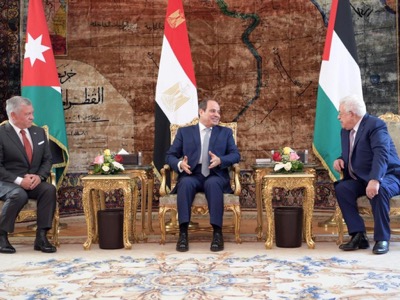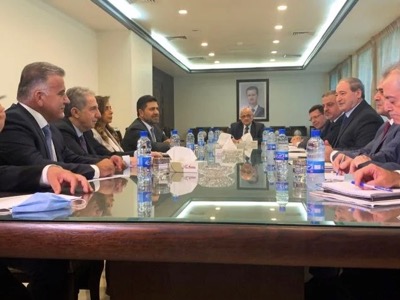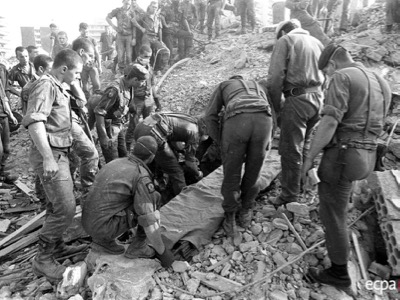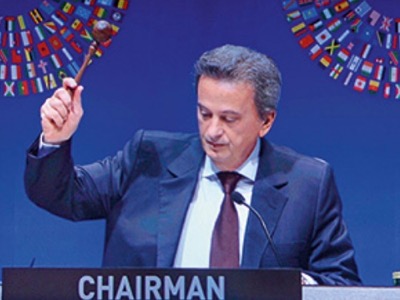The post-Syrian war Middle East is taking shape. Everything would change: Syria would join the Russian-led military coalition and be de facto protected by it. Lebanon would be placed under joint Russian-US tutelage but occupied militarily by France. Iraq would replace Lebanon as a regional mediator. Iran would be admitted to the Mediterranean.
This article is a follow-up to
"Why a Yalta II?", June 15, 2021.
"Biden-Putin, a Yalta II rather than a new Berlin", June 22, 2021.
Moscow and Washington are preparing the reorganization of the Levant that they drew up during the Geneva meeting (known as "Yalta 2") on June 16. The aim is to draw conclusions from the terrible Western military defeat in Syria without humiliating the United States.
According to this peace agreement, Syria would be placed in the Russian zone, while Lebanon would be shared between the West and Russia.

THE BAGHDAD AND CAIRO SUMMITS
We are moving towards a withdrawal of the US army from Iraq so that this country becomes a mediator, a neutral zone, instead of Lebanon. Iraq has therefore convened a summit in Baghdad with seven of its neighbors (Saudi Arabia, Egypt, Emirates, Iran, Jordan, Kuwait, Turkey). France managed to join the participants both as a representative of the West and as a former colonial power.
The former director of the Iraqi secret service and now Prime Minister, Mustafa al-Kazimi, showed his great knowledge of regional issues and his ability to maintain the balance between Sunni Saudi Arabia and Shiite Iran. Despite several contacts over the past year and more conciliatory rhetoric, these two powers have not known how to resolve their multiple disputes, particularly in Yemen.
The Baghdad meeting was an opportunity to display an alliance between President Abdel Fattah al-Sissi (Egypt) and King Abdullah II (Jordan) to manage (not solve) the Palestinian problem. It was immediately followed by a meeting in Cairo of the two heads of state with their Palestinian counterpart, President Mahmoud Abbas. The latter was all the more conciliatory as he is aware that, from now on, no Arab country will come to the aid of his people. It is not possible to demand justice for 70 years while betraying all those who help you.
The French presence has been interpreted as an announcement of a military intervention by Paris after the U.S. withdrawal. President Emmanuel Macron is said to have ambitions to deploy troops in Lebanon to defend western interests as the country comes under joint US and Russian tutelage.
Turkey was dragging its feet throughout the summit. It does not intend to leave the regions of Iraq and Syria that it has invaded without receiving a Western compensation. But it does not want the Kurdish mercenaries, who are also allies of the United States, to be treated in like manner. Yet France continues to believe that the Turkmen and Kurds of northern Syria could each obtain some form of autonomy within the Syrian Arab Republic. Russia, which is an ethnic federation, seems to be in favour of this, but Damascus still does not want to hear about it because its population is so mixed. Before the war, Turkmen and Kurds were not in the majority anywhere. Rojava, a territory "self-administered" by the Syrian Kurds, is only a front for the US military presence. The United States fears that its military withdrawal from Iraq will mean the same panic for its Kurdish collaborators in Syria as its withdrawal from Afghanistan did for its Pashtun collaborators.
Syria was the big absentee at the rumored summit. A secret Syrian delegation was reportedly seen in Washington. Moscow is reportedly considering Syria’s membership in the Collective Security Treaty Organization (CSTO), the Russian equivalent of Nato.
Dotted line, the Baghdad summit was haunted by the issue of hydrocarbons in the Mediterranean. Oil and gas fields have now been identified. Their exploitation remains largely impossible because it is necessary to fix the borders that have not been fixed, then to grant authorizations to companies capable of drilling deep under a large quantity of water and finally to secure the installations. The division between the pro-USA and pro-Russia is still not clear. It will depend on the docility of each party to melt into the political mold that is proposed.

THE IMPOSSIBLE CASE OF LEBANON
The future of Lebanon was not mentioned in Baghdad, but it is becoming clearer. In theory, this country, which participated in the war against Syria on the Western side, will be the only one where the Pentagon will not apply the Rumsfeld/Cebrowski doctrine of "endless war".
It seems impossible to reform the current electoral law, which divides the country into multiple constituencies linked to each of the 17 religious communities between which the territory is divided. Yet this system has run out of steam and has shown its inanity. But if a democratic system of political representation were to be adopted, there is no doubt that Hassan Nasrallah would be elected President of the Republic and that Hezbollah would have a majority in Parliament. No one wants that.
Perhaps, however, the power sharing between the President of the Republic (Christian), the President of the Government (Sunni) and the President of the Assembly (Shiite) could be reached. With this in mind, on July 30 the European Council adopted a framework of sanctions against Lebanese political leaders who refuse to accept any structural change. For the moment, no one has been named, but this weapon is ready to be used.
The matter is further complicated by the fact that the division of power in the administration is between three super-communities, but not equally so: 50 per cent Christian, 30 per cent Shia and 20 per cent Sunni. However, the composition of the population has not stopped changing since the civil war of the 1980s. Today, as far as we know, the Christians are only 20%, the Sunnis 35% and the Shiites 45%. The President of the Republic, the Christian General Michel Aoun, defends his "prerogatives" tooth and nail, i.e. the historical domination of his community over the others.
France is planning to send a contingent for the legislative elections scheduled for May 8 (just after the French presidential election). Its soldiers will guarantee the security of the polling stations. No one doubts that they will succeed, if nothing changes. But at the first reform, those who arrived with applause will become occupiers and will be chased away. What a bizarre idea to have legislative elections secured by the former colonial power! Everyone remembers that in 1983, two terrible explosions simultaneously destroyed the headquarters of the French and American forces in Beirut -while the regional heads of the CIA were meeting there-; two acts of war that left 299 dead. Bernard Emié, the director of the DGSE and also in charge of Lebanon for the Élysée Palace, was optimistic and assured that the Cold War was over and that this kind of event would never happen again; the Cold War was certainly over, but the desire for independence of the people persisted.

Without realizing it, France is laying the groundwork for its next fiasco: President Macron keeps repeating President Biden’s rhetoric: he will not help any state to build itself, but all of them to fight against terrorism. This is the slogan of the International Coalition in Iraq and Syria, which has not stopped for 7 years to massacre civilians and guide the jihadists. It was also the doubletalk of President Biden to justify the takeover of the Taliban in Afghanistan and the resurgence of Daesh. In short, it is always the way we talk when we want to ravage states.
The Lebanese have built a system of corruption that bears no relation to what exists elsewhere. The various leaders of the 17 confessional communities get along very well to collectively extort as much money as possible from their respective protectors. Then they more or less redistribute this money to their base. For example, if you want to build a big infrastructure, you usually have to pay bribes to compensate the people whose rights you are violating or the officials who are responsible for enforcing local laws. Not in Lebanon. In Lebanon, in order to help one community, you have to compensate the other 16 for not helping them. Each aid has to be paid twice: once to the recipient, and once to the 16 leaders of the other faith communities. This works as long as the outside powers are embroiled in their rivalries but becomes tragic if they also agree among themselves. Suddenly, there is no money at all.
Hoping that the agreement between the United States and Russia will last, France intends to rebuild Lebanon. It awarded the port of Beirut and the port of Tripoli (and its refineries) to Russia. Moscow had proposed to rebuild everything in leasing, but some Lebanese do not want the Russians and they refuse to pay twice. So why not the French proposal? But the Israelis thought that the port of Haifa would replace the port of Beirut. They too will ask for their tithe.
In any case, nothing can be built until Lebanon has a government. Hassan Diab’s government has resigned since... August 10, 2020. Former Prime Minister Saad Hariri, who was expected to succeed him, finally threw in the towel. Another former Prime Minister, Najib Mikati, who has since been approached, may also throw in the towel. Both face the President of the Republic, General Michel Aoun, who intends not only to keep a blocking minority in the government, but also to hold the Ministries of the Interior and Justice so that his men cannot be tried, and those of Social Affairs and the Economy to control negotiations with the IMF. The Sunnis want to rebalance the institutions, protect their men and gain access to the IMF’s golden goose. Ditto for the Shiites.

The only way out would be to sacrifice a scapegoat, Riad Salamé, the head of the Central Bank, a Christian who has put himself at the service of the Sunni Hariri family. He would be made to bear the responsibility for the collective crimes and the bankruptcy of the country in exchange for maintaining the privileges of the Christian community.
The only personality above the rest, the Secretary General of Hezbollah (but apparently not the other leaders of his party) is trying to save his country. Hassan Nasrallah has been buying Iranian oil, despite US sanctions, so that his fellow citizens can fuel their cars, heat their homes and work. 82% of Lebanese now live below the poverty line according to the United Nations, whereas their country was so rich that it was nicknamed the "Switzerland of the Middle East". Immediate outcry from the 16 other communities that will not be paid the bribes required by the system.
Two Iranian oil tankers are currently in the Mediterranean. The United States did not seize them, nor did it sink them, as it usually does without anyone protesting either the act of war or its environmental consequences. A delegation of US senators visiting Lebanon last week mildly condemned this violation of the US embargo and praised the initiative of the US ambassador. She proposed to import Egyptian gas. A Lebanese ministerial delegation visited Damascus, the first since the beginning of the war in 2011. They discussed this project insofar as the Egyptian gas should transit through Syria. She also discussed a project to buy electricity from Jordan, again via Syria. And perhaps, but it should not be said, the landing of Iranian tankers at the port of Banias rather than in Lebanon.
In reality, it is not possible to reform the functioning of Lebanon as long as each community lives in the memory of the Civil War and fears being massacred. The only solution is to guarantee civil peace and then change the whole system at once. This may be the ambition of France, but it will not be possible because of its past. Another solution would be to organize a military regime, since the army is the only institution that all Lebanese appreciate. However, the military is at the bottom of the social ladder, even lower than the immigrant domestic workers. Soldiers get $60 a month compared to $200 for women who are forced to work. In any case, their leader, General Joseph Aoun (no relation to the President) was trained in the USA. He is standing by.
https://www.voltairenet.org/article213966.html




















No comments:
Post a Comment